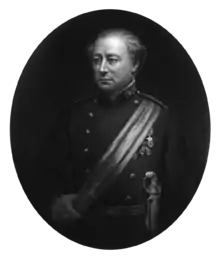Albert Fytche
Lieutenant-General Albert Fytche CSI (21 September 1820 – 16 June 1892) was a British Indian Army officer who served as Chief Commissioner of the British Crown Colony of Burma from February 1867 to April 1871. Educated at Rugby School and commissioned in the 1830s, he was promoted to captain in the 1840s. A string of promotions followed: major in 1853, lieutenant-colonel in 1862, colonel in 1864, major-general in 1868 and lieutenant-general in 1877.
Albert Fytche | |
|---|---|
 | |
| 2nd Chief Commissioner of Burma | |
| In office 16 February 1867 – 18 April 1871 | |
| Preceded by | Arthur Purves Phayre |
| Succeeded by | Ashley Eden |
| Personal details | |
| Born | 21 September 1820[1] |
| Died | 16 June 1892 (aged 71) Bournemouth, Dorset, England |
| Nationality | British |
| Occupation | Administrator |

The bird Bambusicola fytchii is named in his honour.[2]
He was the son of John Fytche of Thorpe Hall, Hoxne, Suffolk, and Anne Wilson. He was a descendant of Ralph Fitch and William Fytche. His father's sister, Elizabeth, married Rev. George Clayton Tennyson,[3] making him a first cousin of Alfred, Lord Tennyson, to whom he dedicated his book, Burma, Past and Present.[4][5]
References
- List, Army (1881). Official Quarterly Half-Yearly Army List. p. 128.
- Beolens, Bo; Watkins, Michael; Grayson, Michael (2020). The Eponym Dictionary of Birds. Bloomsbury Publishing. p. 204. ISBN 978-1-4729-8269-8.
- Fitch of Louth. The Harleian Society. 1906. p. 1226.
- Vibart, Henry Meredith (1894). Addiscombe: Its Heroes and Men of Note. Archibald Constable and Company. p. 478.
- Ryley, John Horton; Fitch, Ralph (1899). Ralph Fitch, England's Pioneer to India and Burma: His Companions and Contemporaries, with His Remarkable Narrative Told in His Own Words. T. F. Unwin. p. 200.